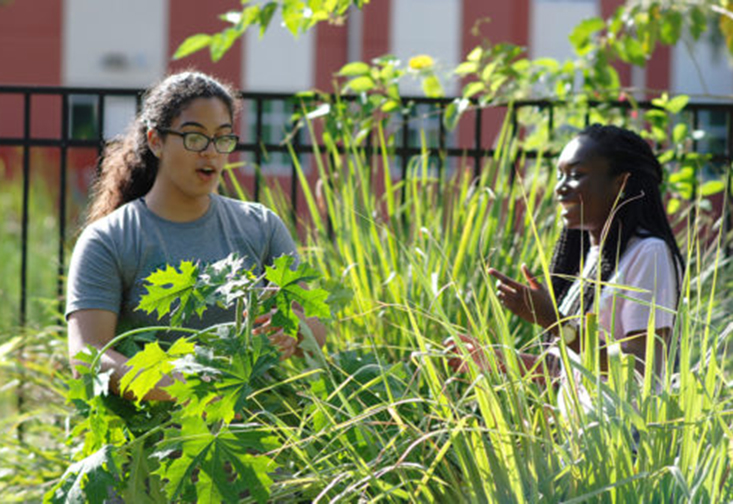During the fall semester, USF St. Petersburg made The Princeton Review’s “Guide to 375 Green Colleges, 2017.” The publication highlights colleges with the most exceptional commitments to sustainability by assessing more than 25 data points, from academic offerings to renewable energy, to determine a university’s “Green Rating” score. USFSP scored of 95 out of 99.
Crucial aspects of this recognition were the increased local, organic and healthier food options on campus. The Guide noted how USFSP spends 25 percent of its food budget on local and organic food. Doing so benefits family farms and the local economy while reducing greenhouse gas emissions by cutting down on food transportation. Overall, these foods account for 23 percent of everything that is consumed in the university’s cafeteria and cafés.
“Strawberries, blueberries, zucchini, squash, lettuce, seafood, bread, even milk are locally sourced,” said Louis Duran, General Manager of Sodexo at USFSP, the food services vendor for the university. “Local farms in the Tampa Bay region are essential to us for providing food for the over 2,000 transactions we handle daily.”
Much of the food acquired locally, or within a 250 mile radius of St. Petersburg, goes into meals at the cafeteria that meet stringent nutritional criteria such as low in sodium and saturated fat. Over half of the meals served meet this standard, and include vegetarian, vegan and gluten-free options, said Duran.
Beyond meal options that are healthier for students and the planet, more spaces are popping up on campus for students interested in learning gardening and urban agriculture techniques first-hand. On the outskirts of campus two years ago lay a quarter acre plot of land that was nothing more than a barren dirt patch. It has since been transformed into a Food Forest housing more than 50 different edible and medicinal plants from herbs and spices to bananas and sweet potatoes.
A brick path meanders around the lush garden and a solar panel powering a burbling pond. In the middle is a gazebo, where students of the USFSP Garden Club meet before spreading out to cultivate the ground and maintain the crops. Once plants are ready to harvest, those who work the Food Forest get to bring home the fruits of their labor.
“We like to think of it more as urban agriculture than just a simple garden,” said Caryn Crabb, president of the student-run Garden Club. “And it teaches us a lot about the natural environment, ecology and permaculture.”
Both the Food Forest and the club that supports it are expanding. The club has tripled in size from just 10 students last year. Students come out weekly to garden the area or simply pick weeds for therapy. Flourishing student interest is now being directed to develop garden beds for seasonal plants around the exterior of its location. Once those beds come to fruition, the Food Forest may produce more than what those working the land will be able to consume.
“We don’t want to grow and harvest beyond what we can’t use, so hopefully if we get to a point where the garden is producing in abundance, we can provide the extra food, possibly to Sodexo, to students on campus or local homeless shelters in downtown St. Petersburg,” said Crabb.
Students in the Garden Club will also benefit from a newly built greenhouse. In partnership with the Florida Wildlife Research Initiative (FWRI), the greenhouse will provide space for Garden Club students to seed more temperamental crops like avocados and mangos that can better germinate under greenhouse conditions and then be transplanted to the Food Forest. FWRI scientists will also grow native plant species for research purposes and the greenhouse will create lab space for future urban agriculture courses.
The focus on food sustainability isn’t a surprise. Care for the natural environment is one of the core values for USFSP. Spearheaded by an active student body and faculty, the university community is investing in solar panels and energy efficient buildings, leading innovative research in sustainability and incorporating environmental stewardship into many planning decisions on campus. USFSP’s Climate Action Plan sets out to reduce the university’s baseline greenhouse gas emissions by 50 percent by 2035 and to achieve carbon neutrality by 2050.
Students play a lead role in sustainability efforts. The Student Green Energy Fund is financed through a $1 fee per credit hour voted on by students every three years. Students working with the Green Energy Fund consider projects that reduce energy costs through conservation and the use of renewable energy to lower greenhouse gas emissions. The Clean Energy and Resource Conservation Committee (CERCC) works with USFSP Administration and Student Government to recommend investments that will most effectively reduce the university’s carbon footprint while improving facilities.
“We rely on our students to brainstorm sustainable projects and initiatives for the university to pursue, and then to think through the mechanics of how to take those ideas and make them operational,” said Sustainability Planner Brian Pullen.
USFSP students involved in sustainability issues and groups such as the Garden Club are seeing the advantages of being involved in learning opportunities outside the classroom.
“There are so many benefits from doing this sort of work such as knowledge of techniques to different perspectives on agriculture to experiencing just a great sense of community,” said Crabb.
